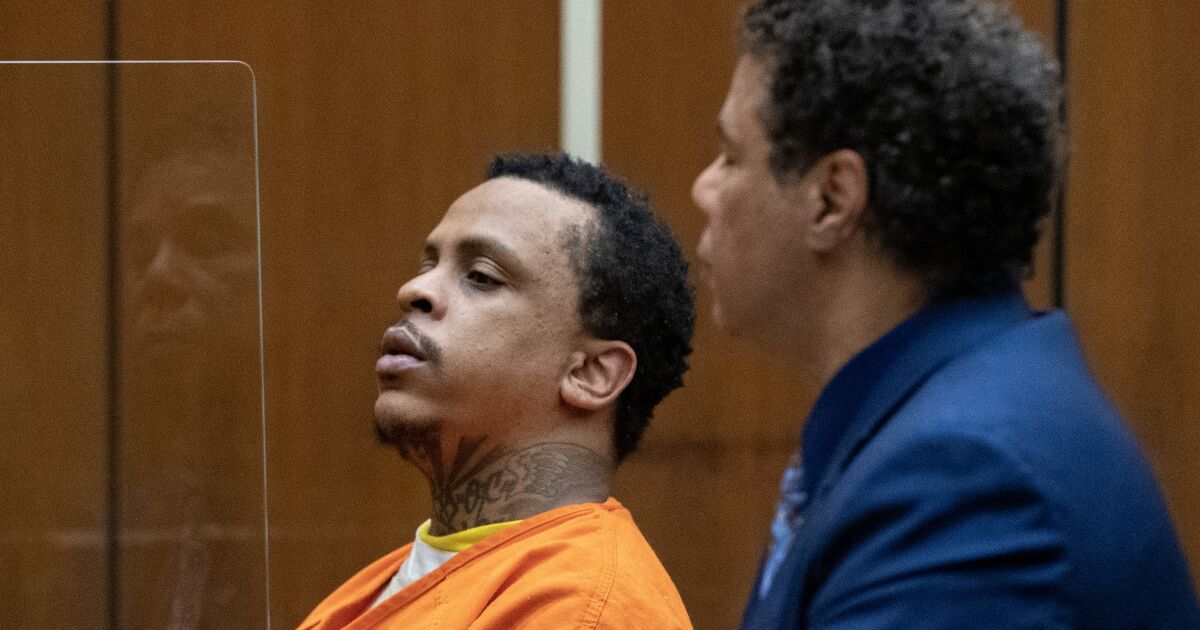Arheel's Uncle
Senior Reporter

Crips gang member sentenced to 60 years in prison in murder of Nipsey Hussle
Eric Holder Jr. was sentenced to at least 60 years in prison after his murder conviction in the 2018 shooting death of Crenshaw rapper Nipsey Hussle.
Crips gang member sentenced to 60 years in prison in murder of Nipsey Hussle

Eric Holder Jr., left, listens during his sentencing proceeding for the murder of Nipsey Hussle in Superior Court. He was sentenced to 60 years to life in state prison.
(Brian van der Brug / Los Angeles Times)
By James QueallyStaff Writer
A Crips gang member was sentenced to at least 60 years in prison Wednesday for killing beloved rapper Nipsey Hussle outside his Crenshaw clothing store in 2019.
Los Angeles County Superior Court Judge H. Clay Jacke sentenced Eric Holder Jr. to 25 years to life in state prison for murdering Hussle and an additional 25 years to life based on a sentencing enhancement because he used a gun. Holder must serve an additional 10 years in prison on assault convictions for shooting two other men who were with Hussle the day of the killing, Jacke said.
Holder, 33, was on a date with a woman who would become his unwitting getaway driver on March 31, 2019, when he approached Hussle in front of the Marathon Clothing store near Slauson Avenue and Crenshaw Boulevard.
The two had a brief conversation, but Holder returned minutes later with two handguns and opened fire in the middle of the parking lot, killing Hussle, whose legal name was Ermias Asghedom, and wounding two other men nearby.
Hussle’s death sparked more than a week of citywide mourning. While Hussle was celebrated nationally for his Grammy-nominated record “Victory Lap,” locally he was seen as a philanthropist and key community figure who had reinvested in the Crenshaw neighborhood he often rapped about. Hussle owned and operated several businesses in the area, including the clothing store where he was killed.
Referred to by some as “Neighborhood Nip,” Hussle had poured nearly $2.5 million into the lot where he was killed and often traveled the area without security despite his status as a hip-hop superstar. He was signing autographs the day he was killed.
Herman Douglas, better known as “Cowboy,” who was a close friend of the rapper, said during Wednesday’s sentencing hearing that Hussle’s murder had torn a hole in the community, leaving people who once relied on Hussle desperate for work.
“Our community right now, we lost everything. Everything we worked for. … Thousands of jobs we don’t have no more. Homies don’t have nothing to do. They backsliding, they robbing people now,” Douglas said. “All our stores are closed down. The whole community relied on Nip.”
The assault was captured on video, and there was no question Holder was the gunman when trial started last year. Instead, defense attorney Aaron Jansen argued Holder should be convicted of manslaughter, rather than murder. His client, Jansen said, became incapable of rational thought after Hussle mentioned there might be “paperwork” on him, slang referring to records indicating Holder had cooperated with police.
Holder and Hussle were both members of the infamous Rollin’ 60s set of the Crips street gang. Jansen argued during trial that being accused of snitching by someone of Hussle’s stature, in front of other gang members in the heart of Rollin’ 60s territory, “triggered” his client.
“This was not just a pleasant conversation between homies who are chopping it up. … This was a serious accusation,” Jansen said during his closing argument last year. “Mr. Holder Jr. took it serious, as it was. He knows the consequences of being called a snitch in this manner.”
Deputy Dist. Atty. John McKinney, however, said the defendant was fueled by jealousy. Holder also was a fledgling rapper, recording tracks under the moniker “Fly Mac.” But his work gained next to no attention, while Hussle’s 2018 record “Victory Lap” was nominated for a Grammy.
On Wednesday, Jansen argued Holder suffered from severe mental illness, reading a letter from the defendant’s father that claimed Holder had been diagnosed with auditory schizophrenia at age 19. Jansen said Holder often heard voices in his head that made him paranoid and erratic, describing a situation just three weeks before the shooting in which he threw a heavy weight through a window in a manic episode because he “feared he would be murdered.”
Jansen did not raise a mental health defense during trial. Jacke ultimately stopped Holder’s psychologist from taking the stand after McKinney objected to her testimony, but accepted her report on the defendant’s mental health.
Displaying a picture of staples placed in Holder’s head after he was slashed with a razor by a fellow inmate during the trial, Jansen asked Jacke to consider sentencing the defendant to 28 years to life, rather than 60, given the extreme danger he will face in prison for killing someone with Hussle’s stature and reputation.
“I want the court to consider what his life is going to be like in state prison. It’s going to be brutal; it’s going to be short. He’s already received numerous death threats. He’s been beaten up. He’s been isolated,” Jansen said. “When the sheriffs can, they isolate him, not just in a one-man cell; we’re talking about whenever he leaves his cell they have to lock down the whole floor so that no one could get to him.”
But Jacke offered no such mercy.
As Holder was led out of court, Douglas started singing, “Hit the road, Jack, and don’t you come back no more,” laughing as Jacke and deputies admonished him and ordered him out of the room.